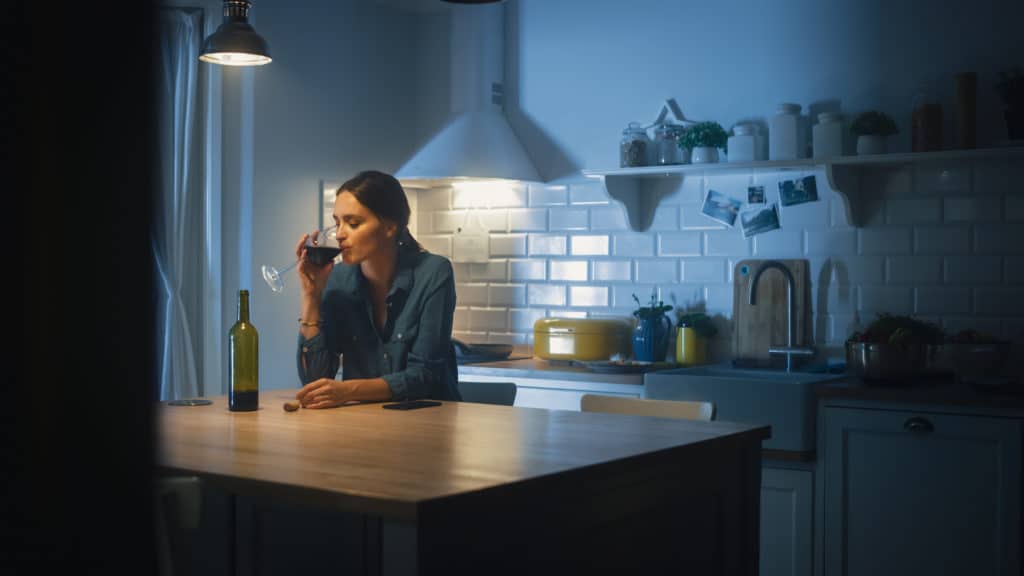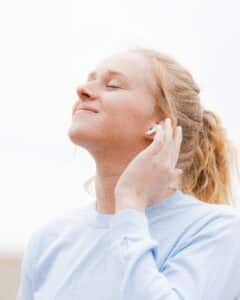Anxiety and alcohol abuse are common co-occurring disorders. People often ask can alcoholism affect anxiety and how to find treatment for substance abuse and mental health issues.
Water Gap Wellness Center is a comprehensive mental health retreat in Pennsylvania that can treat anxiety and alcohol addiction treatment. Contact us today to learn more.
What Are the Signs of Alcoholism?
If you’ve seen someone intoxicated stumble down the street while yelling too loudly and demanding more shots, you’ve seen the primary signs of alcoholism.
Some of the most common signs include:
- Memory issues
- Poor coordination
- Slurred speech
- Impaired judgment
- Wanting to stop or quit drinking but being unable to
- Letting work, family, or social obligations be replaced by alcohol consumption
- Being secretive and hiding how much alcohol is consumed
- Engaging in risky behavior
- Having trouble with the law, usually a DUI
- Having financial issues because the money goes exclusively to drinking
- Being in denial about alcoholism
- Struggling with mental health disorders
How Does Alcoholism Affect the Brain?
If you are wondering can alcoholism affect anxiety, it may be a sign that you or a loved one are suffering from dual diagnosis disorders.
Alcohol
Alcohol consumption might be normalized in society, but its effects are dangerous. Alcohol contains psychoactive substances that alter your brain chemistry, and different types of beverages can have hundreds of different alcohols in them, all of which can form things like congeners with age. Such aged drinks like whiskey have more alcohol and congeners than cheaper, newer drinks.
- Alcohol activates your GABA system and glutamate. This reduces fear or inhibition and turns off your judgment.
- Alcohol changes some of your neuromodulators. As you drink more, you increase the level of serotonin in your body.
- Alcohol stimulates intestinal serotonin in the nerves of your stomach.
- Alcohol releases dopamine which is a neurotransmitter. It acts as a natural opioid, so you get a high or happy feeling, exhilaration, and energy.
The more you drink, the more you become excitable or anxious, struggle with your inhibitions, and experience changes to your natural endorphin levels. These changes can exacerbate endorphin imbalances brought about by anxiety disorders. So anxiety and alcohol abuse can worsen your mental health disorder symptoms.
Anxiety
Anxiety is a natural response to stressful, unfamiliar, or dangerous situations. You might feel fear or a desire to run or find safety if you are being chased, in a car accident, or hear an unfamiliar noise in your home at night.
With anxiety disorders, those normal feelings happen without the chase, accident, or unfamiliar noise; they happen all the time and can disrupt daily life.
- Anxiety floods your central nervous system with cortisol and adrenaline. Your brain regulates these stress hormones.
- Anxiety makes your brain hyperactive, so the amygdala is on alert, waiting for threats or dangerous situations. When this happens, you get a lot of false alarms, so you panic over non-threatening situations.
- Anxiety dims the connections between your prefrontal cortex (the rational part of your brain) and the amygdala (the watchman). So, you stop processing information around you rationally and instead have erratic thoughts and behaviors.
- Anxiety causes your hippocampus (the part that holds long-term memories) to shrink, so you can’t remember things as well. Then anxiety makes the hippocampus believe that memories associated with anxiety are most important, so you end up storing those and retrieving those more than you do typical memories of success, love, family, and safety.
Can Alcoholism Affect Anxiety?
Anxiety and alcohol abuse are often treated together because they co-exist so frequently.
Some people struggle with anxiety disorders. They may or may not have a diagnosis for it which means they may or may not have treatment for it. In these cases, the same person might turn to alcohol to feel better or mask their anxiety symptoms. They don’t realize that they are self-medicating with a substance that can worsen that anxiety.
Other people struggle with anxiety disorders and are on medication, but it seems to make things worse when they drink. In these situations, they don’t realize that alcoholism and anxiety have a distinct relationship, with one affecting the other and vice versa.
How to Alcohol and Anxiety Treatment near New Jersey
At Water Gap Wellness Center, we offer customized treatment plans for alcoholism and anxiety.
Our alcohol rehab near New Jersey allows you to find legitimate treatment for anxiety and alcoholism concurrently. With our programs, you start with detox for your alcoholism and then work with our team to identify any medications you might need to manage the symptoms and severity of your anxiety disorder.
At the same time, we work with you to participate in the most appropriate individual and group therapy sessions but give you skills to manage your anxiety symptoms and apply coping skills other than alcohol consumption. A significant part of your program will also include managing without alcohol and overcoming any triggers or relapse.
If you are ready for help, turn to Water Gap Wellness Center for anxiety and alcohol abuse treatment.




